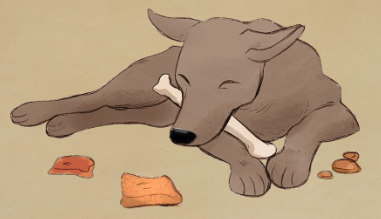Yes, even our ancient ancestors spoiled their pets with treats. Just like we do! New evidence in the Journal of Science Advances, the human-dog bond is older than science, thus far, has suggested.
Archeological remains uncovered in Alaska have re-written our science – by about 2,000 years. This is way earlier than evidence that has been previously recorded in North or South America.
Curious scientists have been interested if our ancient people settling in the Americas came with dogs or if the domestication process happened around the same time as elsewhere in North or South America. They found the lower-leg bone–or tibia–of an adult canine at a site about 70 miles southeast of Fairbanks, Alaska. Radiocarbon dating indicated that the canine lived about 12,000 years ago, near the end of the ice age. During a separate excavation at a nearby site the team found an 8,100-year-old canine jawbone that showed signs of possible domestication by humans.
Chemical analyses of the jawbone and tibia found substantial contributions from salmon proteins. This indicates that the canine regularly ate fish. According to the team, this was not typical  of the canines that lived in the area during this time. Evidence shows that they hunted land animals almost exclusively. A dependence on humans is the most likely explanation for the salmon in the canine’s diet.
of the canines that lived in the area during this time. Evidence shows that they hunted land animals almost exclusively. A dependence on humans is the most likely explanation for the salmon in the canine’s diet.
Community members in this area of Alaska have long considered their dogs to be mystic companions. Nearly every resident in the village is closely bonded to one dog and she spent childhood exploring the area with a local dog as their best friend. According to one local resident, “I really like the idea that, in the record, however long ago, it is a repeatable cultural experience that I have this relationship and this level of love with my dog. I know that throughout history, these relationships have always been present. I really love that we can look at the record and see that thousands of years ago, we still had our companions.”
Source: Science Advances [Link]
